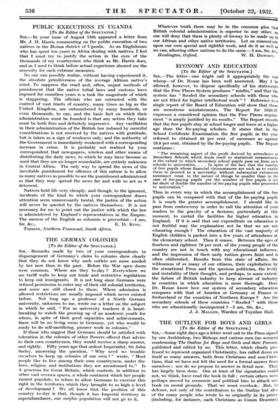PUBLIC EXECUTIONS IN UGANDA [To the Editor of the SPECTATOR.]
Sin,—In your issue of August 18th appeared a letter from Mr. J. H. Harris commenting on the -public execution of two natives in the Hoima district of Uganda. As an Englishman who has spent ten years in Africa dealing with natives, I feel that I must try to justify the action in the eyes of the thousands of my countrymen who think as Mr. Harris does, and as I used to think before actual experience showed me the necessity for such extreme measures.
No one can possibly realize, without having experienced it, the absolute primitiveness of the average African native's mind. To suppress the cruel and, often, unjust methods of punishment that the native tribal laws and customs have imposed for countless years is a task the magnitude of which is staggering. The officials who are entrusted with the -control of vast tracts of country, many times as big as the United Kingdom, are outnumbered by many hundreds, or even thousands, to one, and the basic fact on which their administration must be founded is that any action they take must be both firm and definitely impressive. Any vacillation in their administration of the British law induced by merciful -considerations is not received by the natives with gratitude, but is taken as a sign of weakness only, and the authority of the Government is immediately weakened with a corresponding increase in crime. It is probably not realized by your correspondent that newspapers, wireless and other means of distributing the daily news, to which he may have become so used that they are no longer remarkable, are entirely unknown in Central Africa. The only way to spread the news of the inevitable punishment for offences of this nature is to allow as many natives as possible to see the punishment administered so that they may spread the news far and wide to act as a deterrent.
Natives hold life very cheaply, and though, to the ignorant, incidents of the kind to which your correspondent draws attention seem unnecessarily brutal, the justice of the action will never be queried by the natives themselves. It is not necessary for me to point out the justice with which the law is administered by England's representatives in the Empire. The success of the English as colonists is proverbial.—I am, Sir, &c., E. D. KING. Tzaneen, Northern Transvaal, South Africa.














































 Previous page
Previous page